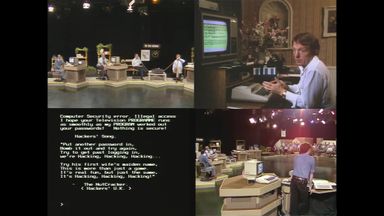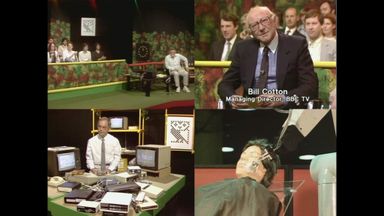MTMOTM Live Special
1. Two hour special
Clips from this programme
Ian McNaught Davis introduces the "Making the Most of the Micro - Live" special
Duration: 00:11Ian McNaught Davis explains why this 2 hour programme is being done live. He introduces John Coll, Dave Ellis and Richard Fothergill, among others
Duration: 01:47A live writing challenge for a group of coders is set by Ian Trackman - create an animated display for small ads in a shop window
Duration: 00:57Where we are: a high street montage of current computers and software
Duration: 02:04The Micro Live live phone-in Question 1 - is BASIC a good or a bad language to learn?
Duration: 01:43The Micro Live phone-in Question 2 - the add ons for a basic computer system
Duration: 00:53The Micro Live phone-in Question 3 - the difference between 8 bit and 16 bit machines
Duration: 01:33The Micro Live phone-in Question 4 - faulty or disappointing computer experiences
Duration: 02:28The Micro Live phone-in Question 5 - why some computers will not work with some TV sets
Duration: 01:05The Micro Live phone-in Question 6 - what's the best Micro to buy?
Duration: 01:28David Ellis explains sound and music sampling using an Apple II, echo effects, demonstrates Musical Simon - a rule-based music program.
Duration: 06:18David Ellis shows the coding for creating sound effects of sea gulls on a BBC Micro.
Duration: 06:18Paul Daniels explains his experiences with home computers and at programming, praises the 30 hour BASIC course and rails at jargon.
Duration: 05:31Stephen Castell and Ian McNaught Davis discuss computer jargon and 'ease of use'
Duration: 02:51Richard Fothergill, Director of the government's Microelectronics in Education Programme, shows some good educational software
Duration: 07:17Software sent as audio data bursts by radio - from Radio West in Bristol
Duration: 03:02Lawson Brown demonstrates the BBC's new Telesoftware service delivered over the CEEFAX system
Duration: 06:22Ian McNaught Davis points out that the analogue Micro Live studio clock has stopped
Duration: 00:16The Micro Live phone-in Question 7 - How to prevent software piracy? Ian Trackman explores software protection
Duration: 02:21The Micro Live phone-in Question 8 - What is machine Code?
Duration: 01:00The Micro Live phone-in Question 9 - What is the copyright situation with Telesoftware?
Duration: 00:42The Micro Live phone-in Question 10 - What advice (from Colin Harris) can be given on word processing courses? Malcolm Peltu comments on other skills employers should encourage.
Duration: 02:36The Micro Live phone-in Question 11 - How can we sell software?
Duration: 01:00The Micro Live phone-in Question 12 - What can be done with data statements? Ian Trackman replies
Duration: 01:08A half-way assessment of how the teams are getting on with their Micro Live Coding Challenge
Duration: 02:56The University of Oxford Local Exam Board's main frame computer is automating many of the paper-based processes used in setting, marking and administrating exam papers. It is also collecting data from the schools using their newly acquired home micros
Duration: 05:07John Coll demonstrates electronic mail using an acoustic coupler to access British Telecom Gold's system. On logging on, John Coll downloads messages sent to the program but is interrupted by hackers, who send messages uninvited into the studio. This hacking incident highlighted the importance of keeping passwords complex and secret. The notorious hack and the Hackers' Song has become part of computer history.
Duration: 08:17A clip from the film War Games highlights illicit hacking and stimulates a discussion about computer crime - e.g. from disgruntled employees or adolescent hackers and the chaos they can cause.
Duration: 04:45The BBC Buggy arrives bringing coffee
Duration: 00:57How the series subtitles are produced by the BBC Micro. In the television studio control room John Coll explains how the two images - one from the BBC Micro - are put together using a black edge generator and synchronising the signals.
Duration: 03:07John Vince, head of computer graphics and Middlesex polytechnic demonstrates a commercial device for subtitling amateur video at home on a micro
Duration: 03:01John Vince, head of computer graphics and Middlesex polytechnic demonstrates the creation of 3D models and explains how a 3D model of Superman was created for the feature film Superman III
Duration: 01:21The Micro Live phone-in Question 13 - How to use a Vic 20 for large graphics characters
Duration: 01:10The Micro Live phone-in Question 14 - Music education and computers - Richard Fothergill explains what is being done to help teachers
Duration: 01:40The Micro Live phone-in Question 15 - How to make a bleep noise on a Spectrum when a key is pressed.
Duration: 01:08The Micro Live phone-in Question 16 - How to make games programs run faster
Duration: 01:19The Micro Live phone-in Question 17 - How to get cleaner sound on a BBC Micro
Duration: 00:50The Micro Live phone-in Question 18 - What is artificial intelligence? Ian trackman demonstrates a simple program which might show learning if not intelligence.
Duration: 01:38New IT jobs being created for young people in the (then) deprived areas of Notting Hill with the help of the local Nottingdale Centre initiative
Duration: 04:57Kenneth Baker (minister for Information Technology) comments on new training initiatives and new jobs being created in the IT industry. He talks about the need for increased computer literacy and about the growth of the IT industry in Britain. Kenneth Baker also launches a national secondary school software competition with 48 prizes of up to £5,000 each.
Duration: 12:17The Micro Live coding competition results are revealed, warts and all.
Duration: 06:03The Micro Live programme ends with a trail for upcoming series on robotics and the electronic office.
Duration: 00:12MTMOTM Live Special - Series 1
1. Two hour special
First broadcast: 2nd October 1983
Duration 01:54:46
In a live edition of Making the Most of the Micro, Ian McNaught-Davis is joined in the studio by an audience of micro users and a team of experts. There are demonstrations of hardware and software, including a live download of a program from the BBC's new Telesoftware service, and a look at how the micro can be used to subtitle home videos. Dave Ellis makes micros make music, John Coll demonstrates an electronic mail service, and three teams of programmers, working on different micros, write software against the clock. And a national software competition is launched by the Minister for Information Technology, Kenneth Baker. Whether you are expert or novice, you can take part in the programme by joining in the phone-in, and putting questions or comments to the experts. Producer DAVID ALLEN Director PATRICK TITLEY
Now playing
MTMOTM Live Special - Series 2
1. One hour special
First broadcast: 24th June 1984
Duration 01:00:12
Ian McNaught-Davis risks the failure of both hardware and software as he introduces the second live programme of items about the world of microcomputers-among them: the computer 'hackers'-who are they? BBC Radio's Basicode explained; American reporter Freff attempts to send a computer program live from New York and also delves into the world of computer-generated art as he meets graphics artist Loretta Jones. Plus the announcement of the winners of the BBC's National Schools Software Competition - with 930,000 worth of prizes - which was launched in the first Micro Live last October. Technical adviser STEVE LOWRY Assistant producer TERRY MARSH Studio director PATRICK TITLEY Producer DAVID ALLEN














































